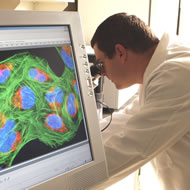
Environmental Factor, September 2008, National Institute of Environmental Health Sciences
Extramural Update
September 2008

New Grant Opportunities on Functional Characterization of Genetic Variants and Interactions
NIEHS and the National Institute on Drug Abuse (NIDA) have announced a pair of funding opportunities on behalf of the NIH Genes, Environment and Health Initiative. The closing date for applications under RFA-DA-09-003(http://grants.nih.gov/grants/guide/rfa-files/RFA-DA-09-003.html) ![]() and RFA-DA-09-004(http://grants.nih.gov/grants/guide/rfa-files/RFA-DA-09-004.html)
and RFA-DA-09-004(http://grants.nih.gov/grants/guide/rfa-files/RFA-DA-09-004.html) ![]() is October 17, 2008.
is October 17, 2008.
These grants are intended to encourage functional characterization of genetic variants believed to be associated with a particular disease or disorder outcome through gene discovery approaches, such as genome-wide association studies, candidate gene approaches and sequencing studies. Measuring the discrete contribution of a particular variant or environmental factor for the condition and being able to assess them in combination with other alleles/environmental factors is an integral component of the NIH Genes, Environment and Health Initiative (GEI).
Understanding the function of the gene variants identified through genome-wide association studies (GWAS) and other gene discovery approaches and elucidating the mechanisms of how they contribute to disease is an obvious next step towards realizing how best to relate the genomic data obtained from GWAS approaches to improving public health. One of the biggest challenges in functional genetics is establishing that a particular SNP or gene variant in a disease-associated region is indeed the variant contributing to or causing the disease. Innovative approaches utilizing computational and systems biology and the integration of “-omics” methodologies, such as genomics, comparative genomics, proteomics, transcriptomics, metabolomics, epigenomics and informatics, with such high-throughput technologies as RNAi, tissue arrays and others into comprehensive pathway-driven approaches are encouraged for applications to this initiative in order to understand functionally and mechanistically the role of environment, development and genetics in complex human diseases.
Areas of interest include relatively low throughput approaches, for example transgenic mouse approaches, to test some of the most promising variants for changes in function and high-throughput tests, such as yeast, C. elegans, cell culture systems or computational approaches, to look at different aspects of variant function. Model organisms and/or human studies are also encouraged, as is utilizing state-of-the-art technologies to explore cellular, physiological and/or behavioral function of the whole organism. This funding opportunity will use the R21 and R03 mechanisms with the R03 applications focused on projects that are pilot studies in nature and may not have preliminary data.
The GEI is a four-year, NIH-wide program to support efforts to identify major genetic susceptibility factors for diseases of substantial public health impact and to develop technologies for reliable and reproducible measurement of environmental exposures that interact with genetic susceptibility to influence health and disease. The program is being coordinated and implemented by an NIH-wide GEI Coordinating Committee, administratively led by NIEHS and the National Human Genome Research Institute (NHGRI).
For more information on the GEI program see: http://www.gei.nih.gov/index.asp("http://www.gei.nih.gov/index.asp) ![]()
Contacts
NIEHS: Kimberly McAllister, Ph.D.
NIDA: Joni Rutter, Ph.D.
"Upcoming Distinguished..." - previous story ![]()
![]() next story - "Extramural Papers..."
next story - "Extramural Papers..."
September 2008 Cover Page



